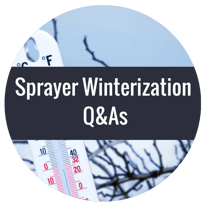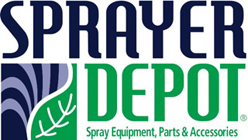Winterizing your sprayer is not an option, it's a requirement. Before winter starts or after the end of spraying season, make sure you winterize your sprayer before you put it away. We know we constantly talk about seasonal maintenance but we just can't stress it enough, performing regular maintenance will ensure a long life for your sprayer.
spraying season, make sure you winterize your sprayer before you put it away. We know we constantly talk about seasonal maintenance but we just can't stress it enough, performing regular maintenance will ensure a long life for your sprayer.
In this short Q&A, we answer the most common sprayer winterization questions we receive from customers.
1. Should I perform any type of maintenance before winter starts?
You definitely should! Winterizing your spray equipment is an important step to ensure the performance of your sprayer.
2. When should I winterize my spray equipment?
You want to winterize your sprayer before temperatures drop below freezing. In areas like Florida, where the temperatures don’t drop too much, you should winterize your sprayer before you store it at the end of season.
3. What materials do I need to winterize my sprayer?
You will need clean rags, a bristle brush, clean water, pump oil (see manufacturer’s recommendations), antifreeze, an all weather tarp and a tire pressure gauge (if your sprayer has wheels).
4. As long as I wear gloves while cleaning the sprayer I’ll be fine, right?
Wrong. Personal Protective Equipment (PPE) is very important when handling any type of pesticide, herbicide or other chemicals. Make sure to wear a long sleeve shirt, pants, eye wear, respirator or mask, gloves and boots.
5. Which steps should I follow to properly winterize every part of my spray equipment?
Follow these 5 easy steps:
- Flush the system with clean water
- Drain the tank and open all valves; Use compressed air to blow out any liquid from solution lines
- Run the pump just long enough to ensure that the system is drained of water
- Run antifreeze through the system long enough to reach any hoses and booms; We recommend diluting the antifreeze 50/50 with either water or windshield washer fluid
- Cover the sprayer with the tarp so that dirt, insects, etc. cannot enter the equipment
6. Should removable parts remain attached to the unit?
No. Store any removable parts like spray guns, nozzles and strainers in a clean, dry place.
7. What about sprayers with a boom?
Just make sure to also include the following steps as part of your maintenance for the spray boom:
- Remove the boom feed hoses from the boom section valves
- Use compressed air to flush each boom
- Remove the nozzle tube end plugs and continue to blow out any water from the boom
- Remove and clean out any boom section filters
- Remove metal screens or fittings and store the parts in vegetable oil over the winter to prevent corrosion
- Ensure that your boom is free of water, lubricate any O-rings and re-install non-metal components
Looking for more information? Download our comprehensive sprayer winterizing guide for free!

.png?width=280&name=SameDayShippingGuarantee-New%20(1).png)




